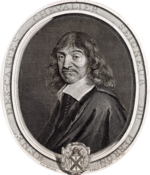The Search for Truth by Natural Light (La recherche de la vérité par la lumière naturelle) is an unfinished philosophical dialogue by René Descartes “set in the courtly culture of the ‘honnête homme’ and ‘curiosité’.” It was written in French (presumably after the Meditations was completed) but that was lost around 1700 and remained lost until a partial copy was discovered in G.W. Leibniz's papers in Hanover in 1908 and published in the Adam-Tannery edition of Descartes's works and correspondence (vol. X, pp. 495-532). A Latin translation, Inquisitio Veritatis per Lumen Naturale, was published in 1683 as part of Renati Des-Cartes Musicae compendium (Blaviana printing house, Amsterdam) and again in 1701 as part of R. Des-Cartes Opuscula posthuma, physica et mathematica (Apud Janssonio-Waesbergios, Boom et Goethals, Amsterdam); it was also included in a Dutch translation of a collection of letters from Descartes published in 1684 by J.H. Glazemaker.
A definitive edition, containing the partial French text plus the fuller Dutch and Latin translations on facing pages was published in 2002. The opening passage (translated by Norman Kemp Smith to English in 1957) "is a helpful commentary on the argument of Articles 74-78" of The Passions of the Soul.
Descartes’s intent
Descartes begins by observing that "even though all the science that we can desire is to be found in books, what they contain of good is mixed with so many uselessness, and dispersed in the mass of so many large volumes, that for it would take longer to read than human life gives us, and to recognize what is useful in it, more talent than to find it ourselves. He therefore adds: "This is what makes me hope that the reader will not be sorry to find here a more abbreviated way, and that the truths which I will put forward will be acceptable to him, although I do not borrow them from Plato or to Aristotle."
The dialogue
Descartes then imagines a conversation between three characters: Eudoxus (Descartes's "mouthpiece"), Polyander and Epistemon. Eudoxus is a man endowed with an ordinary mind, but whose judgment is not spoiled by any false opinion, and who has all his reason intact, as he received it from nature; in his country house, where he lives, he receives a visit from two men of the greatest mind, and the most distinguished of the century, one of whom (Polyander) has never studied anything, while the other (Épistemon ) knows very well everything that can be learned in schools.
Eudoxus praises the merits of doubt: "Only pay me your attention; I will take you further than you think. Indeed, it is from this universal doubt that, as from a fixed and immutable point, I have resolved to derive the knowledge of God, of yourself, and of all that the world contains".
The cogito
Descartes provides, in this reply by Eudoxus to Epistemon, his only statement of the cogito per se, and admits that his insight is also expressible as dubito, ergo sum:
|
… entio, oportere, ut quid dubitatio, quid cogitatio, quid exsistentia sit antè sciamus, quàm de veritate hujus ratiocinii : dubito, ergo sum, vel, quod idem est, cogito, ergo sum : plane simus persuasi. |
… it is necessary to know what doubt is, and what thought is, , before we can be fully persuaded of this reasoning — I doubt, therefore I am — or what is the same — I think, therefore I am. |
Notes
- Erik Jan Bos, who prepared this collection, has argued that all three versions originated from a lost copy made by Ehrenfried Walther von Tschirnhaus.
- ^ These phrases were italicized in the original.
- Translation by Hallam, with additions for completeness.
See also
References
- Descartes, René (2009). La recherche de la vérité par la lumière naturelle (in French). Presses universitaires de France. ISBN 978-2-13-055486-8.
- ^ Ariew, Roger (2003). "Review of La recherche de la vérité par la lumière naturelle de René Descartes. Edited by Ettore Lojacono with Erik Jan Bos, Franco A. Meschini, and Francesco Saita. (Filosofia e Scienza nel Cinquecento e nel Seicento.) Milan: Franco-Angeli, 2002". Isis. 94 (4): 723. doi:10.1086/386438. ISSN 0021-1753. (critical edition)
- ^ Descartes, Rene (1958). "The Search for Truth". Philosophical Writings [Passage from the beginning of the dialogue (A.T. x, pp. 499-506)]. Translated by Smith, Norman Kemp. New York: Random House. pp. 297–300.
- "Descartes – Œuvres, éd. Adam et Tannery, X.djvu/535 – Wikisource". fr.wikisource.org (in French). Retrieved 2021-12-22.
- Descartes, René, and Emmanuel Faye. La recherche de la Vérité par la lumière naturelle: Précédé d'un essai introductif L'invention cartésienne de la conscience [René Descartes, "The Search for Truth by Natural Light", translation and notes by Emmanuel Faye, preceded by an introductory essay: "The Cartesian invention of consciousness"]. Librairie générale française. 2010.
- Descartes, René (1683). Renati Des-Cartes Mvsicae compendivm (in Latin). ex typogr. Blauiana.
- Descartes, René (1701). Opuscula posthuma, physica et mathematica (in Latin). Apud Janssonio-Waesbergios, Boom et Goethals.
- Hintikka, Jaakko (1962). "Cogito, Ergo Sum: Inference or Performance?". The Philosophical Review. 71 (1): 3–32. doi:10.2307/2183678. ISSN 0031-8108. JSTOR 2183678.
- Hallam, Henry (1843), Introduction to the Literature of Europe in the 15th, 16th, and 17th Centuries, vol. II (2nd ed.), p. 451
External links
- Proceedings of the study day, News from the Republic of Letters, 1999 – I (articles in PDF)
